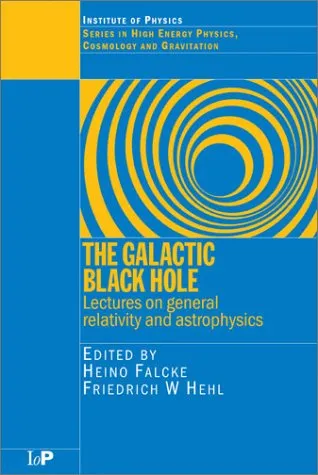The Galactic Black Hole: Lectures on General Relativity and Astrophysics (Series in High Energy Physics, Cosmology and Gravitation)
4.5
Reviews from our users

You Can Ask your questions from this book's AI after Login
Each download or ask from book AI costs 2 points. To earn more free points, please visit the Points Guide Page and complete some valuable actions.Introduction to "The Galactic Black Hole: Lectures on General Relativity and Astrophysics"
Welcome to the fascinating universe of black holes, a realm where the laws of physics are pushed to their extremes and unimaginable mysteries lie at the heart of our galaxy. "The Galactic Black Hole: Lectures on General Relativity and Astrophysics", authored and edited by Heino Falcke and Friedrich W. Hehl, is a comprehensive and multidisciplinary resource that brings together cutting-edge research and theoretical discussions with exceptional clarity. This book serves as an essential guide for anyone who seeks to understand some of the most compelling phenomena in modern astrophysics, including the enigmatic supermassive black hole at the center of the Milky Way.
The volume is not merely an academic textbook but an invitation to explore one of nature's most intense gravitational enigmas. It combines the rigor of Einstein's theory of General Relativity with stellar astrophysics, observational astronomy, and high-energy physics, forming an accessible yet profound introduction to these intertwined scientific domains. Whether you are an aspiring astrophysicist, a seasoned researcher, or simply a curious mind fascinated by the cosmos, this book offers invaluable insights.
Detailed Summary of the Book
"The Galactic Black Hole" is structured into a series of expertly crafted lectures that encompass both theoretical and observational aspects of black hole physics. At its core lies the supermassive black hole believed to reside at the center of the Milky Way, an object historically referred to as Sagittarius A* (Sgr A*). This book not only establishes the astrophysical significance of such black holes but also provides an overview of the advanced technologies used to study them, such as very-long-baseline interferometry (VLBI) and x-ray and radio telescopes.
The narrative begins with an in-depth introduction to Einstein's General Relativity, which provides the foundational framework for describing gravitational interactions in the universe. The authors delve into the principles of spacetime curvature, event horizons, and the various metrics used to describe black holes, particularly the Kerr metric that models rotating black holes. These discussions are followed by a detailed examination of astrophysical phenomena associated with black holes, including accretion disks, relativistic jets, and tidal forces.
Observational breakthroughs take center stage in subsequent chapters, as the authors recount how radio observations and infrared astronomy have lent compelling evidence for the presence of Sgr A*. These discussions are complemented by descriptions of high-energy astrophysical processes, such as the capture of matter by the black hole, which results in spectacular emissions across the electromagnetic spectrum. Special emphasis is placed on the emerging field of black hole imaging, a monumental achievement realized through the Event Horizon Telescope (EHT) collaboration.
Finally, the book contextualizes the study of black holes within larger cosmological frameworks, exploring their role in galaxy formation, stellar populations, and the fundamental laws of nature. This holistic treatment ensures that readers not only gain technical knowledge but also grasp the broader implications of black holes for our understanding of the universe.
Key Takeaways
- Comprehensive yet accessible lectures on General Relativity and astrophysics.
- In-depth exploration of the Milky Way's center and its supermassive black hole.
- Insights into cutting-edge observational technologies such as radio interferometry.
- An integrative discussion of black holes in the context of massive galactic structures and cosmology.
- A clear synthesis of theoretical physics and real-world data from astronomical observations.
Famous Quotes from the Book
"Black holes are not just astrophysical phenomena; they are gateways to the very edges of physics, where space and time betray their familiar notions."
"Sagittarius A* reveals not only the structure of our galaxy but the ingenuity of human beings in uncovering cosmic truths."
"Studying black holes is not merely about understanding what lies beyond the event horizon; it is about pushing the frontier of human knowledge."
Why This Book Matters
"The Galactic Black Hole" stands out as a touchstone for students, researchers, and enthusiasts of astrophysics due to its blend of rigorous scientific detail and philosophical wonder. In an era when black holes are no longer a theoretical curiosity but directly observable entities, this book equips readers with the tools to navigate this extraordinary field of study.
Furthermore, the book's emphasis on interdisciplinary approaches highlights the collaborative spirit of modern astronomy, bridging theoretical physics with practical observations. It sheds light on one of the most significant scientific discoveries of recent decades: the imaging of a black hole's event horizon. The implications of these findings are vast, influencing not only our cosmological models but also our conception of space, time, and reality itself.
By presenting this complex field in an engaging and well-organized format, "The Galactic Black Hole" inspires a deeper appreciation for both the mysteries of the universe and the scientific endeavors that strive to unveil them. It reminds us that the quest to understand the cosmos is one of humanity's greatest and most rewarding challenges.
Free Direct Download
You Can Download this book after Login
Accessing books through legal platforms and public libraries not only supports the rights of authors and publishers but also contributes to the sustainability of reading culture. Before downloading, please take a moment to consider these options.
Find this book on other platforms:
WorldCat helps you find books in libraries worldwide.
See ratings, reviews, and discussions on Goodreads.
Find and buy rare or used books on AbeBooks.
1272
بازدید4.5
امتیاز50
نظر98%
رضایتReviews:
4.5
Based on 0 users review
"کیفیت چاپ عالی بود، خیلی راضیام"


